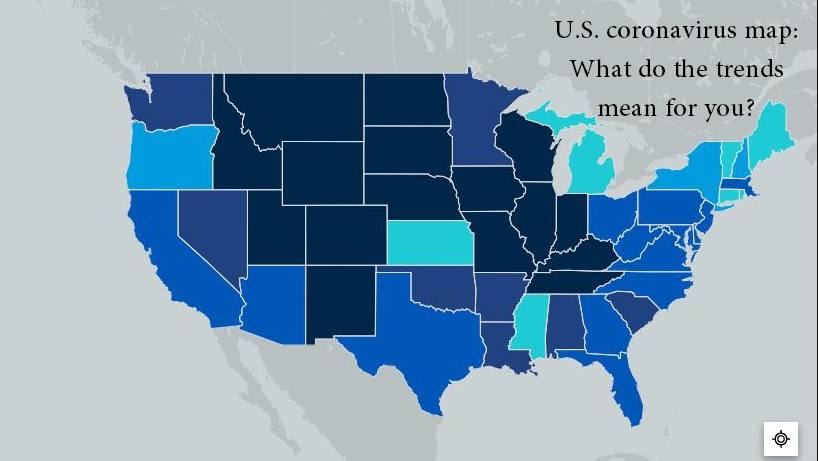
As the COVID-19 pandemic continues, a surge of infections is happening across the U.S. Midwest, including many communities served by Mayo Clinic Health System in Wisconsin, Iowa and Minnesota. Some of those locations have activated hospital emergency surge plans to manage the number of patients hospitalized with COVID-19 infections.
With news about upward pandemic trends, it's important to have accurate information. Below are several debunked myths about COVID-19, that you could share with family and friends.
Myth: Cold weather and snow can kill COVID-19.
There is no scientific evidence to believe colder weather can kill COVID-19 or other viruses. The normal human body temperature remains around 36.5 C to 37 C, regardless of the external temperature or weather.
Use these practices to reduce the spread of COVID-19 in our communities:
- Wear a mask in public. I wear a mask to protect you. You wear a mask to protect me.
- Keep your physical distance — 6 feet or about two arms' lengths apart from other people.
- Avoid in-person gatherings.
- Wash your hands with soap and water. It's simple and effective.
- Stay home if you do not feel well.
- Get a test if you have COVID-19 symptoms. Call your local health care provider to schedule a test.
- Self-isolate if you have been around someone who is sick or tested positive.
Myth: COVID-19 is no worse than the seasonal flu.
Fact: During the COVID-19 pandemic, you may have heard that COVID-19 is similar to the flu. It is true both are contagious respiratory diseases caused by viruses, and people with COVID-19 and the flu may share some common symptoms.
However, after closer comparison, the viruses have been found to affect people differently and have differences. Symptoms of COVID-19 and the flu appear at different times. COVID-19 symptoms generally appear two to 14 days after exposure. Flu symptoms usually appear about one to four days after exposure. With COVID-19, you may experience loss of taste or smell.
COVID-19 appears to be more contagious and spread more quickly than the flu. Severe illness, such as lung injury, may be more frequent with COVID-19 than with influenza. The death rate also appears to be higher with COVID-19 than the flu. COVID-19 can cause different complications than the flu, such as blood clots and multisystem inflammatory syndrome in children.
Another difference is the flu can be treated with antiviral drugs. No antiviral drugs are currently approved and available to treat COVID-19. Researchers are evaluating many drugs and treatments for COVID-19. Some drugs may help reduce the severity of COVID-19.
Watch:MayoClinicHealthSystemleadersurgecommunitiestotakeCOVID-19pandemicandprotocolsseriously.
Myth: I'm currently taking an antibiotic, so this may prevent or treat COVID-19.
Fact: Antibiotics treat only bacteria, not viruses. COVID-19 is caused by a virus. Therefore, antibiotics should not be used for prevention or treatment. However, some people who are hospitalized for COVID-19 may receive antibiotics because they have a different bacterial infection at the same time.
Myth: Fabric masks don't protect yourself or others from COVID-19.
Fact: Simply put, wearing a cloth mask helps decrease the spread of COVID-19. Research shows that a significant number of people with COVID-19 lack symptoms or are considered asymptomatic. These people may not know they are transmitting the virus to others when they talk, sneeze, cough or raise their voice (e.g., singing or shouting). You should wear a cloth mask to reduce the chance of transmitting respiratory droplets (spit) to others around you. You should wear a mask to protect others, and they should wear a mask to protect you.
Myth: Children who develop COVID-19 don't become critically ill.
Fact: Most children with COVID-19 have mild symptoms or no symptoms at all. However, some children get severely ill from COVID-19. They might require hospitalization, intensive care or a ventilator to help them breathe. In rare cases, they may die.
Although the CDC reports fewer children have been sick with COVID-19 compared with adults, children can be infected and become ill with the virus that causes COVID-19, and also spread the virus to others. Children, like adults, who have COVID-19 but have no symptoms (asymptomatic) can still spread the virus to others.
This article was written by staff at the Mayo Clinic Health System.
Read more: Debunking COVID-19 myths
Learn more about: Tracking and trending COVID-19

Information in this post was accurate at the time of its posting. Due to the fluid nature of the COVID-19 pandemic, scientific understanding, along with guidelines and recommendations, may have changed since the original publication date.
For more information and all your COVID-19 coverage, go to the Mayo Clinic News Network and mayoclinic.org.







